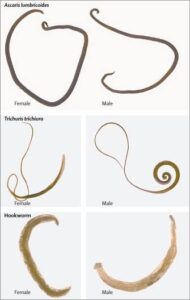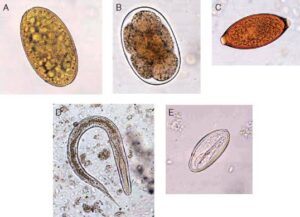Back to: MICROBIOLOGY 300 LEVEL
Welcome to class!
Hi there, bright star! I’m super excited you’ve joined us today because we’re about to talk about some tiny but powerful organisms that can cause big trouble in the human body. These organisms are protozoan parasites, and today we’ll learn about four important ones: Entamoeba histolytica, Giardia lamblia, Trypanosoma, and Leishmania. You may not see them with your eyes, but the illnesses they cause are very real—especially here in Africa.
Entamoeba Histolytica, Giardia Lamblia, Trypanosoma, Leishmania
Protozoa are microscopic, single-celled parasites that can live in water, food, or even in the blood and tissues of humans. Some are spread through contaminated water or food, others through insect bites. These parasites have complex life cycles and can cause diseases that range from mild stomach upset to life-threatening conditions.

Let’s meet each one and see how they behave in the human body.
Entamoeba histolytica
This parasite causes amoebiasis or amoebic dysentery, common in areas with poor sanitation.
It is transmitted through the faecal-oral route—usually by drinking water or eating food contaminated with cysts (a protective form of the parasite).
Once inside the intestines, it transforms into a trophozoite and invades the intestinal wall, causing ulcers and bloody diarrhoea.
In severe cases, it can spread to the liver and cause liver abscesses.
Prevention includes drinking clean water, proper handwashing, and safe food practices.
Giardia lamblia
This causes a disease called giardiasis, known for its foul-smelling, greasy diarrhoea and bloating.
Like Entamoeba, it spreads through contaminated water or food, especially in places with poor hygiene.
It attaches to the walls of the small intestine, interfering with nutrient absorption and causing malnutrition in children.
Prevention is similar—boil drinking water and wash hands regularly.
Trypanosoma
This parasite causes African sleeping sickness and is transmitted by the bite of the tsetse fly.
The disease progresses in two stages:
First, it affects the blood and lymph.
Later, it crosses into the brain, causing confusion, changes in behaviour, and sleep disturbances—hence the name “sleeping sickness”.
It is mostly found in rural parts of sub-Saharan Africa, including Nigeria.
Control involves avoiding tsetse fly bites and using traps or insecticides.
Leishmania
This parasite causes leishmaniasis, transmitted through the bite of infected sandflies.
There are two main forms:
Cutaneous leishmaniasis – causes skin sores that may leave scars.
Visceral leishmaniasis (kala-azar) – affects internal organs like the liver and spleen and can be fatal if untreated.
Found in some parts of West Africa, though more common in East Africa and the Middle East.
Think of these parasites like tiny troublemakers with different styles:
Entamoeba hides in dirty water and attacks your intestines.

Giardia is the picky one—it loves to stick to your small intestine and cause bloating and discomfort.
Trypanosoma is like a night thief that sneaks in through a fly bite and slowly makes your brain sleepy.
Leishmania is the artist—it leaves scars on your skin or quietly attacks your inner organs if not stopped.
Summary
- Entamoeba histolytica causes amoebiasis, spread through contaminated water and food.
- Giardia lamblia causes giardiasis with greasy diarrhoea, also spread through unclean water.
- Trypanosoma causes African sleeping sickness via tsetse fly bites.
- Leishmania causes leishmaniasis, transmitted by sandfly bites, affecting skin or internal organs.
Evaluation
- How is Entamoeba histolytica transmitted?
- What are the key symptoms of giardiasis?
- Which parasite causes sleeping sickness?
- Name two types of leishmaniasis and how they differ.
- What practices help prevent infections by these protozoa?
Well done, star learner! You’ve just tackled some of the most important protozoan parasites affecting Africa and beyond. Remember, your knowledge is powerful—it can help protect lives and bring better health to communities. Stay curious, stay confident, and always keep shining. Afrilearn is proud of youyou and can’t wait to see you in the next lesson!
